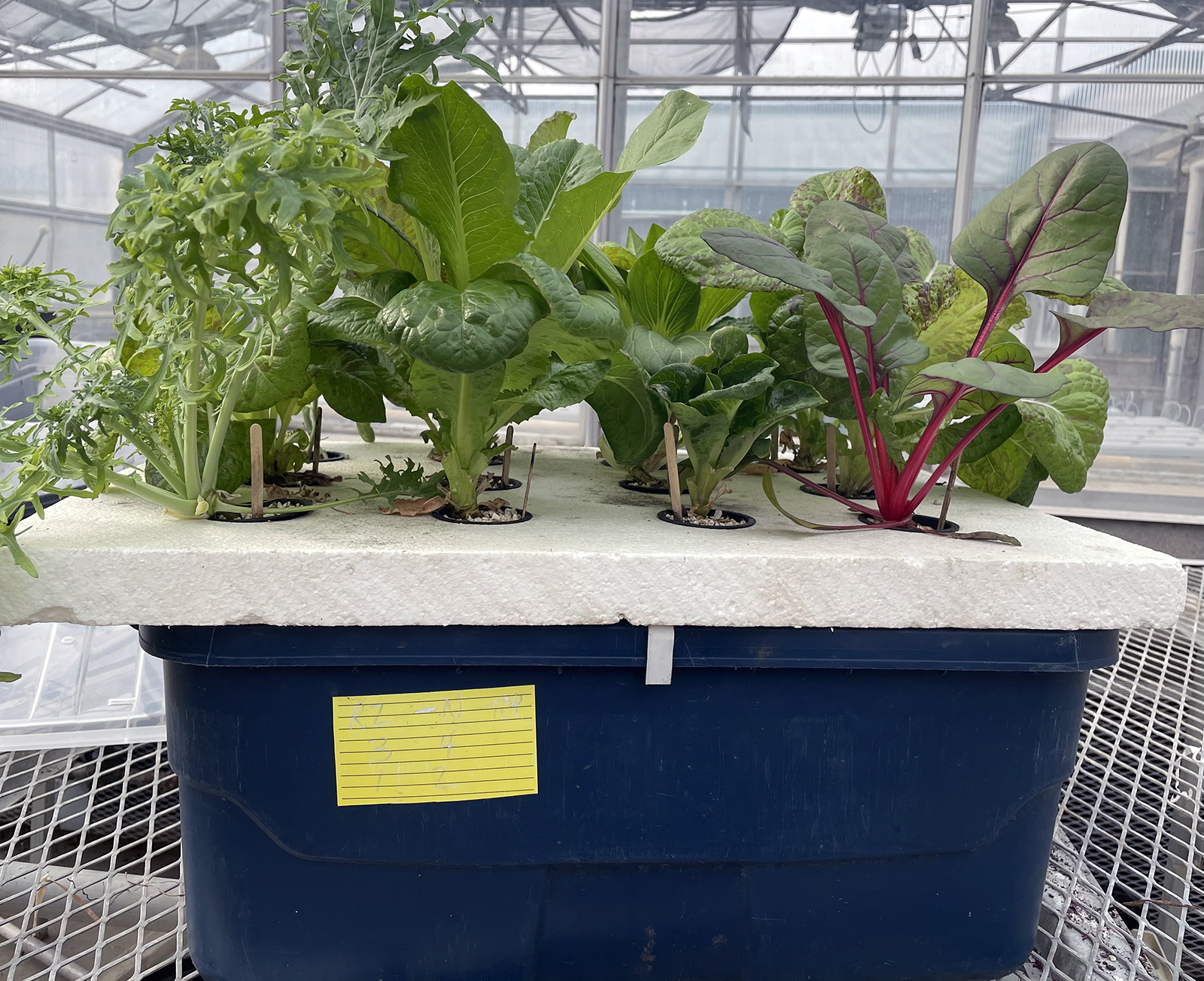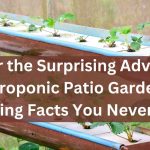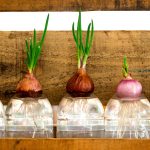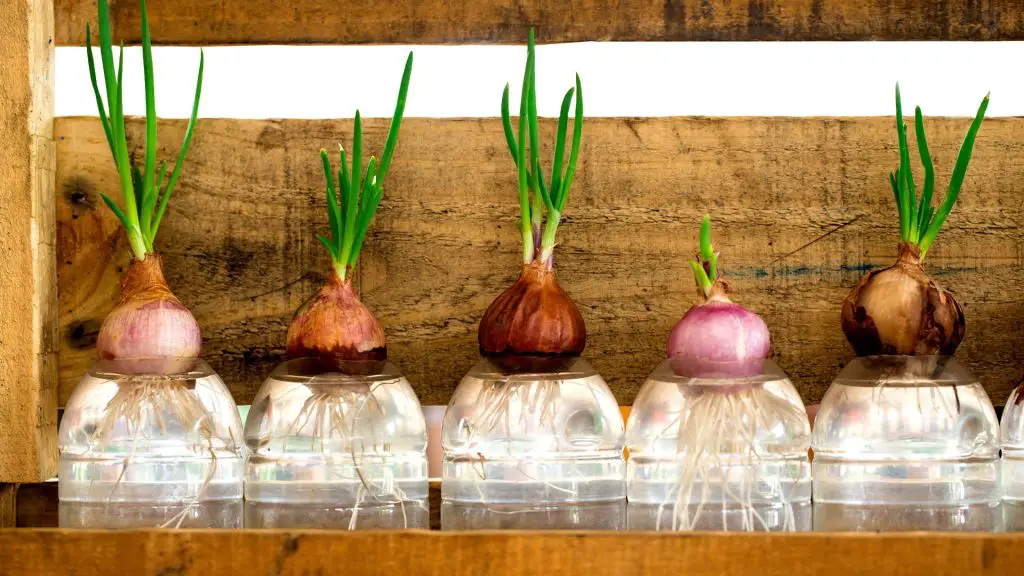To start a hydroponic garden, you need the following: a hydroponic system, growing medium, nutrients, water, and light. Hydroponic gardening is a soilless method of growing plants using nutrient-rich water.
Hydroponic gardening is becoming a popular modern way of growing plants due to its many benefits. Whether you are a seasoned gardener or a beginner, starting a hydroponic garden can be a fun and rewarding experience. It allows you to grow a variety of plants in any season, saves space, and uses less water than traditional gardening.
The hydroponic system provides plants with the essential minerals needed for growth and the growing medium acts as a support structure for the plants. With proper care and attention, hydroponic gardening can produce high-quality, healthy, and delicious fruits, vegetables, and herbs. In this article, we will explore the basics of hydroponic gardening and what you need to get started.

Credit: extension.umn.edu
Benefits Of Hydroponic Gardening
Hydroponic gardening is the future of modern agriculture. It offers numerous benefits over traditional soil-based gardening. One can produce vegetables, fruits, and herbs year-round, irrespective of the weather outside. If you are thinking about starting your own hydroponic garden, here is what you will need and why it’s worth investing in:
Increase In Yield
The plants grown through hydroponic gardening systems mature faster than those nurtured in traditional soil-based gardens. This means, using hydroponics, you can grow more plants in the same amount of time as a soil-based garden, resulting in a higher yield.
- Hydroponic gardening allows fertilizers to be delivered directly to the plant roots, resulting in consistent and healthy growth.
- The precise control over the nutrient solution ensures that plants have access to all the necessary minerals and nutrients in ideal concentrations, leading to a faster growth rate and yield.
Shorter Growth Cycle
Another significant benefit of hydroponic gardening is shorter growth cycles. When a plant has access to all essential nutrients, the root system can focus more on plant growth and development, leading to earlier maturity.
- Plants grow up to 50% faster when grown hydroponically than in soil-based gardens. This means that you harvest crops earlier, resulting in higher productivity.
- Another benefit of the shorter growth cycle is that it decreases the incidence of plant diseases because they are less vulnerable to pests during their shorter growing period.
Reduced Space Requirements
A hydroponic garden requires less space than traditional gardens. Because hydroponics doesn’t require soil, hydroponic systems can be stacked vertically to maximize space utilization.
- Hydroponics has been embraced for urban gardening due to the lack of space.
- Hydroponic methods like deep water culture and aeroponics require very little space, enabling people to grow plants on balconies and roofs.
Year-Round Harvesting
With hydroponics, you can grow vegetables, fruits, and herbs all year long, irrespective of the weather, making hydroponic gardening suitable for people living in all climatic zones.
- Using hydroponic gardening systems, the environment and nutrient solution can be precisely controlled, enabling plants to thrive regardless of the climate.
- Indoor hydroponic gardening systems enable people to grow plants all year-round, providing a year-round supply of fresh produce.
Hydroponic gardening offers a range of benefits beyond what’s available in traditional soil-based gardening. With precise control over the environment and nutrient solution, hydroponic gardening ensures faster growth, higher yields, and year-round harvesting.
Essential Equipment For Hydroponic Gardening
If you’re considering starting a hydroponic garden, you’ll need specific equipment to get started. This section will outline the essential components required to build a successful hydroponic system.
Types Of Hydroponic Systems
There are six types of hydroponic systems:
- Deep water culture (dwc)
- Drip system
- Nutrient film technique (nft)
- Wick system
- Ebb and flow (flood and drain) system
- Aeroponics
Each has different requirements, advantages, and disadvantages. Which one you choose depends on your experience, budget, and what you plan to grow in your hydroponic garden.
Grow Lights
You’ll need the right lighting to simulate sunlight, especially if your hydroponic garden is inside. Effective grow lights provide the necessary light spectrum to give your plants the energy they need to grow and develop.
Ph Testing Kit
Maintaining the right ph levels is essential for hydroponic gardens. Plants absorb nutrients best when the ph level of the water is at the proper level. The ph scale ranges from 0 to 14, with 7. 0 being neutral. Hydroponic gardeners aim for a ph level of between 5.
5 and 6. 5. Testing kits will help ensure that your water is at the correct ph level.
Nutrient Solution
Plants grown through hydroponics depend on you to provide them with complete nutrition. Preparing a hydroponic nutrient solution means providing all of the nutrients – including nitrogen, phosphorus, and potassium – to your plants. You can buy premixed solutions or purchase separate ingredients to mix your solutions.
Growing Media
Growing media is the material that supports your plants in the hydroponic system. It must be porous, lightweight, and hold moisture to allow plant roots to grow. Common growing media include rockwool, perlite, vermiculite, coconut coir, and expanded clay pebbles.
Water Pump And Reservoir
You’ll need a reliable water pump to keep the water circulating throughout your hydroponic garden. The water reservoir should be monitored to ensure proper nutrient levels.
Ventilation System
Indoor hydroponic gardens need proper air circulation to prevent mold and mildew growth. A ventilation system is essential to prevent the buildup of humidity and co2 levels.
Ph Adjusting Chemicals
If the ph level of your hydroponic garden is out of range, you’ll need to adjust it using ph adjusting chemicals. These chemicals will increase or decrease the ph level of your solution.
These essential equipment and tips are critical to starting a hydroponic garden and help ensure your plants grow healthy and strong. Remember to research and understand all the components before you start creating your hydroponic system.
Tips For Starting A Hydroponic Garten
Starting a hydroponic garden can seem like a daunting task, especially for beginners. However, with the right equipment and knowledge, anyone can enjoy a thriving garden full of healthy, edible plants. Beyond purchasing the essential equipment and nutrients, here are some important tips to keep in mind for starting a hydroponic garden:
Choose The Right Location
Selecting the right location for your hydroponic garden is vital for its success. Look for an area that is away from direct sunlight and has a steady temperature between 65 and 80 degrees fahrenheit. Avoid placing your garden next to windows or entryways that may cause fluctuations in temperature, as well as any source of drafts.
Consider adding curtains or shades to block any unwanted sunlight and maintain a consistent growing environment.
Decide On The Type Of System
There are several hydroponic systems to choose from, each with its advantages and disadvantages. Research and select a system that fits both your budget and the types of plants you wish to grow. Common hydroponic systems include deep water culture, ebb and flow, drip irrigation, and nutrient film technique.
Purchase High-Quality Equipment And Nutrients
Invest in high-quality equipment and nutrients, as they are crucial for a successful hydroponic garden. Look for nutrient solutions that provide the necessary macro and micronutrients for your plants. Choose pumps, containers, and lighting systems specifically designed for hydroponics to ensure optimal growth and production.
Start Small
Starting small is a smart choice for new hydroponic gardeners. As you learn more about hydroponic gardening and gain experience, you can expand your garden. Starting with a more compact system also means less initial expense and less time spent maintaining your garden.
Monitor And Adjust Ph Levels
Monitoring and adjusting the ph level of your hydroponic garden is essential for healthy plant growth. The ideal ph range for most hydroponic plants is between 5. 5 and 6. 5. Taking regular ph readings and adjusting the solution accordingly will help prevent nutrient lockout and other problems.
Observe Proper Lighting
Proper lighting is critical for hydroponic gardening success. Ensure that your plants are receiving enough light by choosing the right type and intensity of lighting for your hydroponic system. Some plants require more or less light than others, so research the specific light requirements of the plants you want to grow.
Limit Plant Density
It can be tempting to add more plants to your hydroponic garden than are recommended, but keeping plant density within recommended limits is essential for healthy growth. Overcrowding can lead to nutrient imbalance, disease, and slower growth. A good rule of thumb is to give each plant between one and four square feet of space depending on their size and growth habits.
Be Mindful Of Nutrient Imbalance
Nutrient imbalance is a common problem in hydroponic gardening if not monitored closely. Avoid this issue by following recommended feeding schedules, measuring the strength of nutrient solutions, and regularly checking for signs of plant nutrient deficiencies.
Stay Organized And Maintain Consistency
Like any hobby that requires regular attention, maintaining a hydroponic garden requires organization and consistency. Keep track of feeding schedules, ph levels, and other important information. Maintain consistency in terms of light source, temperature, and humidity to achieve maximum plant health.
Starting a hydroponic garden requires careful consideration of equipment, location, and plant care. Following these tips will help ensure your hydroponic garden is healthy, thriving, and produces excellent yields of nutritious and delicious plants.
Maintenance And Troubleshooting
Basic Maintenance
Maintaining your hydroponic garden regularly is the key to a successful harvest. Here are some basic maintenance tips to keep in mind:
- Keep the ph level of the water between 5.5 and 6.5 by using a ph tester and adjusting the levels by adding nutrients or ph up/down solutions.
- Keep the water temperature between 65°f and 75°f, ensuring that the nutrients dissolve correctly and the plants’ roots are healthy.
- Check the water level regularly to avoid any dry periods or waterlogging, which can lead to plant stress or even root rot.
- Make sure to sanitize your hydroponic system regularly to avoid bacterial growth and diseases that can harm your plants.
Common Issues
Even with proper maintenance, some common issues can still occur when growing hydroponically. Here are a few to keep an eye out for:
- Over or underfeeding your plants: This can happen if you’re not using the right nutrient solution or if you’re not monitoring the ph levels properly. Overfeeding can lead to nutrient burn, while underfeeding can stunt growth and lead to yellowing.
- Algae growth: This is a common issue in hydroponic systems that have too much light or that aren’t properly covered. Algae growth can deplete the nutrients in the water and harm your plants.
- Light burn: If your plants are too close to the grow light or if the light is too strong, they can become stressed and damaged.
Troubleshooting Techniques
If you encounter any of the common issues mentioned above, here are some troubleshooting techniques to help you fix the problem:
- Adjust the ph level: If you notice nutrient burn or yellowing, adjust the ph level of the water accordingly.
- Use an algaecide: If you notice algae growth, use an algaecide to control it. You can also cover your hydroponic system to reduce the amount of light getting in.
- Adjust the grow light: If your plants are suffering from light burn, adjust the height of the grow light or switch to a less intense light.
Keeping your hydroponic system properly maintained and addressing any issues promptly is crucial for a successful harvest. Use these tips and techniques to grow healthy plants and bountiful harvests.
Frequently Asked Questions On What Do I Need To Start A Hydroponic Garden?
What Is Hydroponic Gardening?
Hydroponic gardening is a method of growing plants without soil, using nutrient-rich water solutions instead. In hydroponic gardening, plants are grown in containers filled with water and nutrients.
What Are The Benefits Of Hydroponic Gardening?
Hydroponic gardening offers several benefits, including faster plant growth, higher yields, more efficient use of water and nutrients, and the ability to grow plants year-round. Hydroponic gardening also eliminates the need for soil and the associated issues of pests and diseases.
What Equipment Do I Need To Start A Hydroponic Garden?
To start a hydroponic garden, you will need a container or system for holding the water and nutrients, growing medium to support the plants, a source of light, and a nutrient solution. You may also need a ph meter to monitor the ph level of the nutrient solution.
What Plants Can Be Grown In A Hydroponic Garden?
Most plants can be grown in a hydroponic garden, including vegetables, herbs, fruits, and flowers. Some popular choices for hydroponic gardening include tomatoes, peppers, lettuce, strawberries, and herbs like basil and mint.
Is Hydroponic Gardening Difficult?
While hydroponic gardening may seem intimidating, it is relatively easy once you understand the basics. With proper equipment and care, anyone can start a hydroponic garden and enjoy fresh, healthy produce year-round. There are also many resources available online and in-person to help you get started.
Conclusion
All things considered, starting a hydroponic garden is a great way to grow fresh and healthy produce all year round, regardless of the weather outside. This modern take on traditional gardening techniques proves that anyone can cultivate their own produce without the need for a large outdoor plot of land.
To start a hydroponic garden, it’s crucial to have the right equipment, such as a grow tent, light source, water pump, and nutrient solutions. Once you have these basics, you can choose the crops you’d like to grow and begin experimenting with different techniques such as nutrient balancing and ph adjustments.
With a little bit of research and effort, you can create a thriving hydroponic garden right in your own home. So why not embark on this exciting new journey, and start enjoying the benefits of fresh and healthy produce today?

“My name is Leo Jacob, and I hold a Bachelor of Science degree with Honors in Applied Environmental Science and Sustainability from the University of the West of Scotland. Since childhood, I’ve been passionate about living an eco-friendly life. After completing my studies, I dedicated myself to finding simple ways to lead a more environmentally conscious lifestyle. I launched ecolifely.com to share my educational background and practical experiences with everyone, hoping to inspire others to join me in creating a greener, more sustainable world.”




